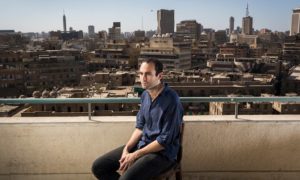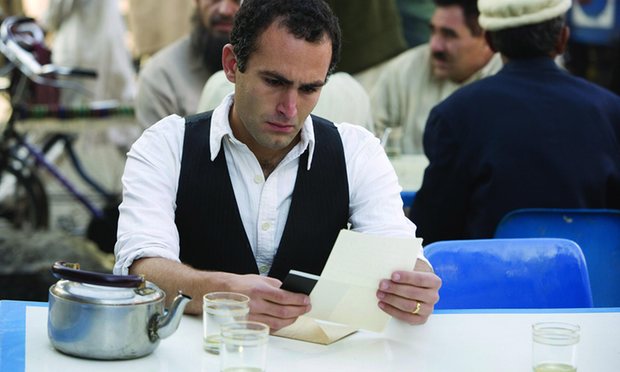Khalid Abdalla: 'I didn't have the right to play Arab roles unless I had lived the struggle'
The Kite Runner actor is also an activist involved in documenting Egypt’s uprising and subsequent collapse. So why has the Cairo premiere of his new film been called off?
For Khalid Abdalla, the boundary between life and art has repeatedly blurred and shifted over the past six years. The actor, best known for his roles in films such as The Kite Runner and Green Zone, has portrayed a film-maker struggling to finish a documentary in the tense political climate of pre-revolutionary Cairo, starred in a documentary about the 2011 revolution, actually documented the same uprising and its troubled aftermath, and set up a film centre in the Egyptian capital to support independent film-makers.
Juggling these politically sensitive projects, Abdalla says he felt “profoundly trapped in a loop”. From being at the centre of the anti-government protests in Tahrir Square, he has since experienced the optimism of the revolution give way to disillusionment. With the rise of President Abdel Fatah al-Sisi, he now finds himself precariously navigating a new crackdown on Egyptian artists and activists that recalls the corruption and brutality of the ousted Mubarak regime.
Just to compound the sense of deja vu, Abdalla is currently promoting his latest film, In the Last Days of the City, which finished shooting in Cairo six weeks before mass demonstrations broke out across Egypt on 25 January 2011. The actor plays a film-maker, also called Khalid, in the midst of a creative and personal crisis, seemingly unable to find a direction for his documentary, failing to find a new flat and coming to terms with a breakup – circumstances complicated by the everyday chaos of the city and the organised violence of the regime.
“He is the kind of person that you’re actually afraid you are, who’s nice enough and warm enough, a good enough person but not special,” says the actor. “He’s been a difficult character to live with.”
Yet the actor says there is something progressive about the ineffectual nature of his alter ego. “The hero [in western and Arab cinema] is frankly someone who normally kills us. Whether it’s the patriarchal or the political, they’re essentially what we’re revolting against.”
In person, Abdalla, 35, exudes the same quiet intensity as the character he portrays. Polite and soft-spoken, his answers are often steeped in political or cultural theory and he can examine or unpick an idea – sometimes exhaustively – from every angle. But unlike his fictional counterpart, the actor’s intellectual curiosity does not deter him from action.
Abdalla was in London when the revolution broke out on 25 January 2011, but quickly returned to Cairo to join the anti-government demonstrations. He immersed himself in the political and cultural change overtaking Egypt, helping to found the media collective Mosireen (meaning “we are determined”) to document the protests in Tahrir Square, shooting on the frontline of clashes with the police and the army. For the past five years, he has been helping to assemble a digital archive of these historic events from thousands of hours of footage shot by the collective, protestors and eye-witnesses. “I hadn’t picked up a camera before In the Last Days of the City,” he says. “I played a version of who I’ve become.”
As Abdalla puts it, the film was made with a sense of foresight and edited with a sense of hindsight. Footage shot amid actual anti-government demonstrations in Cairo in 2010 took on new meaning after the revolution broke out but the actor denies the film anticipated the uprising.
“It’s not like we had any special insight in terms of what was going to happen,” he says. “The film’s title was decided in 2008. It’s just that the situation was so awful, things couldn’t carry on like they were. There was a strong sense that something was going to shift and the whole country knew that … What you see extremely in the film is a people, city, buildings that have been broken down. Broken in the way that you break down animals.”
Meanwhile, the film’s portrayal of media censorship, state propaganda and police oppression – in one scene officers grab a man off the streets and beat him in a side alley – remains all too recognisable. “Scenes we captured so innocently pre-revolution have resonance in the [current] counter-revolution situation,” says Abdalla. “Everyone jokingly says that things have gone back to the way they were [before the revolution] and the film embraces [that].”
This perhaps explains why In the Last Days of the City has just been excluded from the Cairo international film festival (CIFF), where it was due to have its Middle East and North Africa premiere on 17 November. The official reason, given by the festival board in a letter sent after the film was shown at the London film festival last month, is that it has had too many international screenings, but Abdalla suspects the truth is more political. More than 300 film-makers and cultural figures have published a letter calling on CIFF, which is organised by Egypt’s ministry of culture, to reverse the decision.
“It’s a heartbreaking situation for us,” says Abdalla. “Their last-minute deselection has left us without a Middle East and North Africa festival premiere, and sabotaged our plans. We just hope it’s not a sign of what’s to come from censorship.”
I first met Abdalla in Cairo in March 2014, when he was helping to establish Cimatheque, an alternative film centre in downtown Cairo, near Tahrir Square, co-founded with the director of In the Last Days of the City, Tamer El Said. This was, he tells me two and a half years later, the darkest period in his life. The revolutionary movement was reeling from the return to military rule following a coup in July 2013 that ousted Egypt’s first elected president, Mohamed Morsi, the Rabaa massacre the following month, when hundreds of Morsi’s supporters were killed in clashes with the security services, and the subsequent declaration of a state of emergency and curfews across the country.
As a star of The Square, the award-winning 2013 documentary about the revolution and the subsequent political fallout, Abdalla was a highly visible figure and understandably anxious of reprisals by the authorities. One of his friends, who I interviewed days before, had recently burned the source material for his artworks after his flat was raided by the secret police.
“I hit the darkest place I’d ever hit at the end of 2013/beginning of 2014,” Abdalla recalls. “The Rabaa massacre had happened and the whole country was under curfew. Mosireen was under threat. The Square was coming out. Cimatheque was being built. I was living in one room in my parents’ house. I was suffocating myself between the split of focus of all of this.
“I had a point where I would be woken up by the negativity of my thoughts attacking me for an hour or longer. I couldn’t get rid of the thoughts. It was an hour and a half of attack in the morning. Me staring into space. Just blank walls, a loop of thoughts. The sense of the abyss was overwhelming.”
How did he resurface from that hole? “This will sound really pretentious, but what got me out of it was as soon as I would hear that voice, I’d pick up a book and drown it out with someone else’s words, which I actually wanted to hear,” he says. “Books of history and the philosophy of revolution, Gilles Deleuze, a lot of economics, stuff that was bigger than me. Reading all of this became therapeutic.”
Abdalla’s choice of self-help reflects his deep political convictions and the sense of having a responsibility to pursue a life and career that doesn’t compromise those ideals. Born in Glasgow to Egyptian parents and brought up in London, activism is part of his heritage. His father, Hossam, was a leading student activist in the 1970s and his paternal grandfather, Ibrahim Saad El-Din, was a respected leftist economist. Both men were imprisoned several times because of their politics.
So it is perhaps unsurprising that Abdalla’s filmography reads like a guide to the 21st century’s geopolitical crises: United 93 (9/11), The Kite Runner (the Afghan war), Green Zone (the Iraq war), and The Square (the Egyptian revolution). His next project, out in 2017, is a documentary called The Vote, about the first Egyptian election after Mubarak’s fall, co-directed by his sister, Hanan, and his wife, Cressida Trew.

Paul Greengrass ( left) and Khalid Abdalla (right) on set of the film United 93. Photograph: Moviestore Collection/Rex
“I started my career not seeing my colour,” says Abdalla. “But I graduated from university in 2003, right after the war in Iraq started and while I was there, 9/11 happened. And the films have asked me the question: am I willing to live up to the responsibilities they put in front of me? The last 10 years has been me going into Hollywood cinema, playing Arab roles. I had a right to do that but I don’t feel I had a right to make a career of it without living in the Arab world and without struggling in Arab cinema.”
Abdalla’s recent return to London sees him taking on a new but happier responsibility – fatherhood. His son Nawar’s name means one who brings light. “We certainly need it,” he says, smiling. “I’m extremely happy I have a child now. I feel freed by it.”
Yet the actor will return to Cairo in this month, staying until just before Christmas. “Then in January we work out what to do afterwards,” he says. “We’ve understood that there has to be a lifetime of living in both places. I can’t leave Egypt and I can’t leave here. Part of that struggle is the arc of my family and I don’t want to burden my child with it.”
What hope does he have now for a democratic Egypt to emerge from the remains of the revolution? “The situation right now is horrendous – economically, politically, socially,” he says. “I don’t know whether it’s going to go from worse to worse or whether there’s another watershed moment that no one will easily put their faith in. Everything’s closing down. But we’re going to try to salvage as much as we can. I feel the need to live for that whatever the cost.”
• In the Last Days of the City will be screened on 5 November at the ICA, London, as part of the Film Africa festival. There will be a Q&A session with Khalid Abdalla and co-star Laila Samy afterwards.
https://www.theguardian.com/film/2016/nov/04/khalid-abdalla-interview-in-the-last-days-of-the-city-egypt


